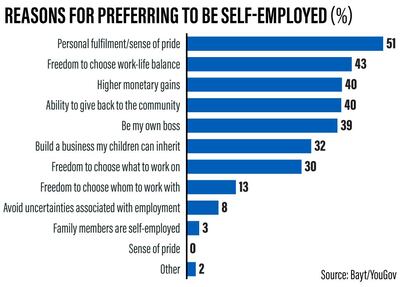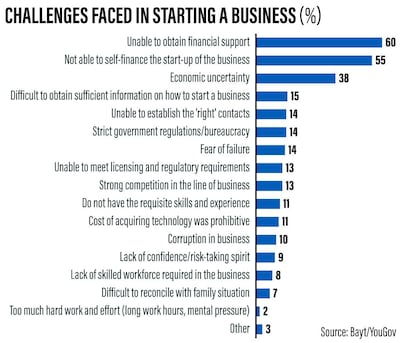About six in 10 UAE residents would prefer to be self-employed if given the choice, according to a new survey conducted by job site Bayt.com and market research agency YouGov.
Personal fulfilment and freedom to choose a work-life balance were cited as the main motivation to become entrepreneurs by 53 per cent and 46 per cent of respondents, respectively.
Other reasons include the ability to give back to the community (38 per cent) and the freedom to choose what to work on (36 per cent).
The survey, titled Entrepreneurship in the Middle East and North Africa, interviewed 1,763 respondents from more than 17 countries, including the UAE, Saudi Arabia, Lebanon and Jordan.
Small and medium enterprises are an important part of the UAE’s economy and accounted for 53 per cent of the country’s gross domestic product in 2019, up from about 49 per cent in 2018, according to Etihad Credit Insurance.
The UAE was ranked first in the region and fourth globally on the latest Global Entrepreneurship Index. It performed better than big economies such as the US, China, Japan, the UK, Australia, South Korea and some countries in the EU. The country was previously in fifth position on the 2019 index.
Last year, start-ups in the Mena region secured a record $1 billion in funding despite the coronavirus pandemic, with technology ventures attracting the most capital, according to data platform Magnitt.
“The positive attitudes about entrepreneurship that we see in the Mena region are an encouraging sign,” said YouGov research director Zafar Shah.
“It indicates that there is both a supply of potential entrepreneurs and those who may support their efforts. The ideas and innovations born in small companies and start-ups create a stronger economy, offering greater opportunities for upward mobility.”
However, 47 per cent of UAE respondents put the acquisition of new skills and job security as their main reasons for preferring to work for a company rather than being self-employed.
Across the Mena region, 63 per cent said they would prefer to work in the private sector, the survey found.
Among those who are currently employed in the UAE, seven in 10 are thinking of starting their own business while 19 per cent have tried to start their own company in the past.
Only 3 per cent have never thought of being self-employed, the poll revealed.
Meanwhile, seven in 10 UAE respondents looking to set up a business said securing finance was the biggest challenge while 46 per cent listed the establishment of the right contacts as their top concern.
Industries that hold the most appeal for aspiring entrepreneurs include information technology, internet and e-commerce (12 per cent), commerce, trade and retail (9 per cent), consumer goods (9 per cent) and property, construction and property development (8 per cent), the survey said.
In Egypt, 71 per cent of respondents would rather be self-employed, while 75 per cent of respondents in Sudan want to run their own business.
About half, or 47 per cent, of respondents said that starting a business could be done at any time while 28 per cent said the best time to do so would be at mid-career stage.
Meanwhile, 88 per cent of UAE respondents perceive entrepreneurs to be opportunity-driven while nine in 10 said they help to create new jobs.
Many entrepreneurs intend to grow their start-ups, with two thirds of respondents planning to hire for their business over the next year.
When it comes to expansion, 37 per cent of Mena respondents harbour plans to grow their business in their country of residence, but 27 per cent aim to operate in several markets, the survey found.
Among those who are self-employed in the Mena region, 38 per cent are at the start-up stage. The poll revealed that 28 per cent said their businesses is not doing well while 15 per cent are satisfied with the performance of their businesses.




